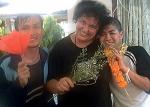A Dongle?
New Luxury tax on internet usage in Thailand
All internet accounts to be taxed with 970 Baht/month. ($235)
Hardware dongle required for internet use
BANGKOK: — The government has announced heavy investment to upgrade Thailand’s international bandwidth, but has introduced an internet tax to help fund investment, and control usage.
The internet tax will be based on bandwidth and would be applied on a graduated scale according to the speed of a users internet connection. The internet luxury tax will be 970 Baht/month for most users.
Foreigners without a work permit and retirees will be required to pay the monthly tax at a higher rate, 1,490 Baht/month. ($361)
Sombat Merou-Ruang, director of the Alien Internet Control Division at CAT headquarters in Bangkok says “foreigners that do not have work in Thailand only hang out on internet forums, visit pornographic sites and other website lamock, different from Thai citizens who mostly use the internet for banking, ecommerce, and furthering their education.” (Right…and I have a bridge in Oaxaca to sell you! Now the bar girls will have to pay more for writing to their johns in Germany or the US of A begging money for their grandmothers’ operation before she dies!}
In addition to the bandwidth tax, an extra usage tax of 490 Baht will be levied on those using Bittorrents and surfing foreign language internet forums.
New hardware required
The new internet tax will require all internet users in Thailand to install a hardware dongle from CAT. The dongles can be picked up free of charge from any 7-Eleven outlets in Thailand starting today. Without the dongle, users will be disconnected after 6 minutes of use and unable to access the internet from 23.30pm tonight.
A dongle is a small hardware device that connects to a computer serial port, to administrate the software who controls the user. When the tax dongle is not present, the software runs in a restricted mode or refuses to run. Windows XP and Windows Vista operating systems are likely to hang without the tax dongle installed.
“This is a disaster” says Jarunsek Khlongtoy, owner of the Sanuk Internet Cafe at Khao San Road in Bangkok. “We need to raise our minute fees up by 300% from today, and set aside special computers for those wishing to use internet forums.”
Malee Thorlee, manager of the Excite Internet shop on Sukhumvit says that she will now have to limit foreigners using the internet in the shop to one at a time, to keep costs down.
The head of CS-Loxinfo Department of Internet, Dr. Boonlert Chaamaak says this is a blow to internet users in Thailand, who already enjoy fast internet speeds and almost no down time.
DTAC has announced a new range of GPRS packages for foreigners, starting with 100hrs for 2,000 Baht, to combat the new internet tax. Other operators are likely to announce new GPRS charges soon.
Internet satellite to me moved
Shinsat PLC welcomes the tax, and has pledged to use the extra funds allocated to them to improve satellite internet communications. Dr. Rinrada Maimeepompem, head of IPstar Internet Speeds Division, has announced plans to move the IPstar satellite closer to earth from next month, which should improve speeds greatly due to less distance for the signal to travel. The new owners Temasek will also use this opportunity to move the satellite nearer to Singapore, as it is now theirs.
TOT sources have said that executives are overjoyed at the prospect of government investment, adding that now they would be able to buy a new fleet of vans for their technicians, which is important if they wish to improve internet speeds and quality.
“This is typical for the CAT monopoly”, says Dr. Pat Pong, administrator at Thaivisa.com, the leading portal for expats in Thailand. “We strongly believe this is just the government wanting to keep track of the internet usage”. He continues: “Thaivisa.com will launch its own nationwide ISP shortly, trying to bypass the new internet tax with a new speed concept. We will provide speeds of 300 and 1200/75 baud, which is not taxable”, says Dr. Pong to Reuters.
Foreigners applying to the Internet tax need to provide a valid passport with Non-Immigrant Visa, health certificate and 6 colour photos 4×2 cm, plus a verified copy of their house registration (Tabien Baan) or lease agreement.
CAT will close all unregistered internet accounts before midnight today.
Thaivisa.com/Agencies 2007-04-01
Tags: Bangkok, Dual Pricing, Expats, Internet, Thailand


Leave a Reply